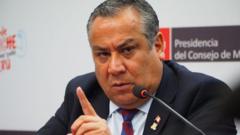The resignation of Prime Minister Gustavo Adrianzén comes just hours before a critical no-confidence vote, exacerbating Peru's existing political instability under President Dina Boluarte. The vote was prompted by public outrage following the kidnapping and murder of 13 mine workers, which has ignited protests against rising crime and government inaction. Adrianzén's resignation marks the third instance of a prime minister stepping down during Boluarte's turbulent presidency, leading to the replacement of the entire cabinet as mandated by the constitution. This political shift compounds Boluarte’s declining approval ratings which have plummeted due to citizens' frustrations regarding the government's handling of crime, including extortion by gangs.
Peru's Prime Minister Steps Down Amid Political Turmoil and Rising Crime Rates

Peru's Prime Minister Steps Down Amid Political Turmoil and Rising Crime Rates
Peru faces a political crisis as Prime Minister Gustavo Adrianzén resigns ahead of a no-confidence vote, further impacting President Dina Boluarte's administration.
Protests have increasingly turned vocal, with demonstrators demanding decisive government action to address safety and security issues, underscored by calls to end targeted killings and violence in the mining regions. In conjunction with these unrests, Boluarte's administration has undergone cabinet reshuffles, but recent appointments have now been rendered futile as all ministers must resign alongside the prime minister's departure. As public dissatisfaction with crime continues to grow, Boluarte faces increasing pressure to restore public confidence in her government’s efficacy.
This political upheaval illustrates the fragility of Boluarte's government, whose challenges extend beyond just leadership transitions to the core issues of public safety and governance that have gripped the nation. With a new prime minister needed to advance any strategy, Peru's political landscape remains uncertain.
The shifting political dynamics in Peru come amidst broader societal frustrations and economic concerns, leaving many to question the future stability and governance of the country as it grapples with escalating crime and persistent political challenges.
This political upheaval illustrates the fragility of Boluarte's government, whose challenges extend beyond just leadership transitions to the core issues of public safety and governance that have gripped the nation. With a new prime minister needed to advance any strategy, Peru's political landscape remains uncertain.
The shifting political dynamics in Peru come amidst broader societal frustrations and economic concerns, leaving many to question the future stability and governance of the country as it grapples with escalating crime and persistent political challenges.




















